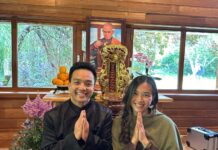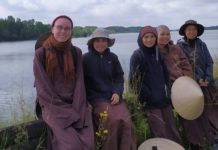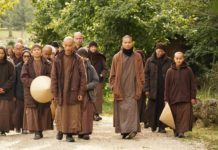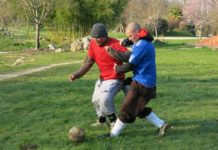Step Into Freedom and Taste True Happiness
5 YEAR MONASTIC TRAINING AND SERVICE PROGRAM
Description:
When we train as a monastic we have the opportunity to find the root of our freedom, solidity, joy and happiness, and to help our society. When we ordain and wear the brown robe we learn to cut through our illusions and our afflictions. We learn to transform our deepest suffering into a bright future and into an even brighter present. In this process of knowing ourselves and facing our difficulties, we will also learn how to change our society into one that is more compassionate, understanding, and happy. This is a natural process, because as we discover the root of virtue in our own life we will also be able to help other people to stop creating suffering for themselves and for the world.
Five years of monastic training is a great chance for you to learn how to live your life meaningfully, to discover brotherhood and sisterhood, and to make possible right here and right now the social change we have always dreamt about. Tasting the simple life of a monk or a nun and cultivating your spiritual life, you will be able to assist your elder brothers and sisters in organizing retreats and events all over the world. You will be able to share your practice and transformation and help a great deal of people, including children, couples and families. When we let go of the pursuit of wealth, power, and sensual pleasures, and put on the brown robe, we do not need to wait five years to be able to help people. Right from the first day, we inspire those around us by simply walking with mindfulness, solidity, and freedom.
Please visit any of our centers in the US, France, Germany, and Thailand to enquire about the program and learn more about the application process.
Basic Requirements:
Age from 17 – 35. If you are under 18, you must have the consent of your parents.
Single or divorced. Your relationships with those close to you are settled, and your decision in harmony with them, so that they will not be an obstacle to your training as a monastic.
No incurable disease, or serious medical condition. Your mental stability and physical health should be sound enough not to be an obstacle or a challenge for your training and for that of the community. A medical and blood check will be required for you to enter the program.
No debt or financial ties. As monastics we take refuge in the Sangha, and do not have debt or hold bank accounts and/or credit cards. If needed, you can freeze any bank accounts that you have and close credit card accounts, so that you may rely fully on the Sangha for all your needs and sustenance (food, clothes, medicine, and shelter.)
Commitment to study, practice, and serve. Our training is to flow as a Sangha. You commit to learn how to practice as a community and to follow the guidance of the Sangha, including attending all Sangha activities. Monastics who cannot commit to follow the Sangha schedule and practices invite their way out of the community.
Letting personal possessions go. As part of your training you will be asked to release items such as laptops, cellphones, etc. and to come into the community with your hands empty.
Family visit. You can visit your blood family members for 14 days after training for two years as a novice. You can keep in contact with them, care for them, and share your happiness with them by writing them letters and calling them from time to time.
Program:
Inquiry period: Come to any of our centers and practice as a normal retreatant for a period of two weeks before inquiring about the program. Consult a monk or a nun about his or her life to learn more about monastic life and living in the community. If you find that this way of life is in harmony with your deepest aspiration and you are able to find happiness with the daily practice, you can write a letter to share your desire to enter the five-year training program. The community will meet to discuss your request and may invite you to join the aspirant program when there is harmony in support of your request and when it sees that the conditions for your training are sufficient.
Aspirant period (3 months to 1 year): Once approved for the program, you will be given a gray robe to wear during your training as an aspirant. You will be invited to move into the aspirant quarters with the other trainees. An assigned aspirant teacher will guide you in this initial period of training and transition into monastic life.
Your training is not just about learning knowledge and ideas. It is a practice that you learn to apply in your daily life so that you are able to transform your suffering and grow in your understanding and compassion. In this period you will be asked to release your possessions and worldly commitments so that you can be free enough to begin to live as a monastic.
After up to one year of training, the monastic community will meet to look deeply at your practice and your aspiration. On the basis of this, the community will decide whether you are fit to be ordained as a novice, or whether it is more suitable for you to continue your practice as a lay member of the community.
Novice period (3 years): Once ordained as an novice, you will be invited to move into the monastic residence to live with the other monks or nuns.
Your training will focus even more on monastic life based on the novice training book, Stepping Into Freedom, and the guidebook on community living, Joyfully Together. You should always keep in mind that monastic training is fundamentally different from academic pursuit at a university. Rather than just acquiring knowledge and developing our expertise, as a monastic we are reminded to come back to the basic practices of mindful breathing, walking, eating, and listening to the bell even when we have practiced for five, ten or thirty years. You will train and develop mindfulness, concentration and insight, based on the fine manners and precepts of a novice monk or nun, which take their concrete expression through your daily actions of body, speech, and mind.
You will share a room with two, three, or four other monks or nuns and be assigned a mentor to guide your practice. After three years, you may be qualified for full ordination into the Bhikshu or Bhikshuni community, with Thay and the community’s approval.
Full ordination (1 yr): For this period, you will enter the Bhikshu Sangha and practice as a full-fledged member of the monastic community, observing the higher precepts of a monk or a nun.
For more information about the life of a monk or nun in our community, please read our description on how we live and train as a monastic with a lifetime commitment.
Recommended reading: Old Path White Clouds, Happiness, Stepping Into Freedom, Joyfully Together





















I want to Join 5 Year Monastic Programme , can you please guide me through the process
Dear Suma,
You may read more about the 5 year monastic program here: https://plumvillage.org/about/becoming-a-monastic
If you wish to know more details about the process we recommend you to contact the practice center you are interested in and they can help guide you further.
/Jojjo from Wake Up International